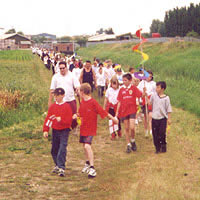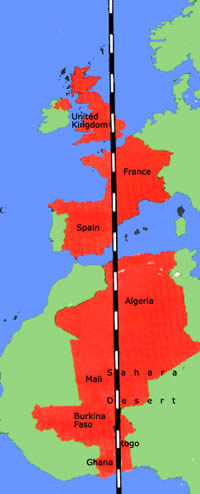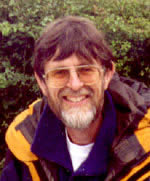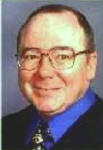WHITE AMERICANS AND
EUROPEANS
WALK IN CHAINS
TO APOLOGIZE FOR SLAVE TRADE
Lifeline Expedition in the USA Began With A Journey of Friendship and
Reconciliation Along The Meridian Line And Beyond
By Michael
Ireland
 LONDON, ENGLAND (ANS)
-- Between the end of September and the middle of
October, white Americans and Europeans walked in a replica yoke and
chains as a symbolic sign of penitence for the sins of their
forefathers in the Atlantic slave trade. (Pictured: 600 schoolchildren joined the
Jubilee 2000 Lifeline walk at Chatteris in Cambridgeshire,
England). LONDON, ENGLAND (ANS)
-- Between the end of September and the middle of
October, white Americans and Europeans walked in a replica yoke and
chains as a symbolic sign of penitence for the sins of their
forefathers in the Atlantic slave trade. (Pictured: 600 schoolchildren joined the
Jubilee 2000 Lifeline walk at Chatteris in Cambridgeshire,
England).
Africans and Africans of the Diaspora accompanied them as they have
traveled on a pilgrimage toward healing, hope and peace, which has also
sought to raise awareness of slavery and racism in our own day, says a
press release from organizers.
The group, which wore T-shirts inscribed with the words
“So Sorry,” traveled to several East Coast cities, including Baltimore,
Salem, Marblehead, Boston, Providence and Newport, RI, Charleston,
South Carolina and Richmond and Jamestown Virginia.
As they have journeyed along the East Coast, the group encountered a
wide range of emotional reactions, from skepticism and protests to
sympathy and gratitude.
The journey began in Annapolis where the Lifeline Expedition joined
with the Kunta Kinte-Alex Haley Foundation to commemorate the
anniversary of the arrival of Kunta Kinte on the slave ship Lord
Ligonier on September 29, 1767.
The event drew the attention of protesters from the National Alliance
who displayed placards bearing the words “White Guilt Zone.”
At the conclusion of the event, Chris Haley, direct descendant of Kunta
Kinte, and Orlando Ridout IV, a direct descendant of the person he was
sold to, led the descendants of slaves and slaveholders in an act of
reconciliation.
The group walked eight miles in the yoke and chains from the center of
Charleston to McLeod Plantation on James Island and on Sullivan’s
Island, where thousands of enslaved Africans were prepared for sale,
penitents from the Netherlands, England, France and USA knelt at the
historic marker and offered an apology for the role of their respective
nations in the slave trade.
In Richmond, the expedition was in partnership with a number of
organizations including the city’s Slave Trail Commission. A night time
walk in the yoke and chains took place from where slaves were landed on
the James River to the new historical marker commemorating the 1800
rebellion led by Gabriel Prosser.
A second walk was arranged on the following day. One of the
participants was Vice Mayor Delores L. McQuinn, who presented a
Certificate of Acknowledgement to the Lifeline Expedition and said that
she hoped the event would provide a step toward changing racist
attitudes in Richmond.
Another participant, Christopher Green told the Lifeline team, "I grew
up with so much anger... I saw pictures of burnings and lynchings.
Today I can actually say that I can put it behind me now. I can
actually forgive not only you, I can forgive myself."
A controversial feature of the walk has been the presence of
13-year-old white American Jacob Lienau from Washington State, who also
walked in chains.
“By the end of the slave trade,” Jacob explained, “up to half the
Africans taken captive were my sort of age because they could pack more
in the ships and they didn’t rebel like the grown ups. I want to say
sorry about this, too.”
The Lifeline Expedition visit was reported nationally through
Associated Press and was widely reported in local newspapers and TV
stations. It was also featured on Korean TV Services (SBS). A
documentary film crew captured the events for a film to be released in
2005.
The Lifeline Expedition will continue with journeys to the Caribbean in
2005, West Africa in 2006, and England for the 200th anniversary of the
abolition of the slave trade in 2007.
 THE LIFELINE
EXPEDITION BEGAN WITH THE JUBILEE 2000 LIFELINE WALK IN ENGLAND THE LIFELINE
EXPEDITION BEGAN WITH THE JUBILEE 2000 LIFELINE WALK IN ENGLAND
The Lifeline Expedition began as a reconciliation journey linking the
European and African nations along the Greenwich meridian line (zero
longitude). The first Lifeline Expedition journey was the Jubilee 2000
Lifeline Walk in England, says a website dedicated to the project. (Pictured: The Greenwich
Meridian along which the first Lifeline walkers traveled in 2000.
The whole walk has yet to be completed).
During the course of that journey, it became evident that the major
reconciliation issue between Europe and Africa, was that of the legacy
of the Trans-Atlantic slave trade.
The year 2000 provided a unique moment in time for countries to
recognize the injustices of their past and their present prejudices and
to begin the process of reconciliation.
This was the year that the Lifeline Expedition began with
representatives from different meridian line nations coming to England
and walking together for 260 miles from the North Sea near Hull to
Peacehaven on the English Channel.
As they journeyed together, the team shared a jubilee message of
reconciliation and urged people to support the campaign to release the
poorest countries in the world from debt repayments. They shared their
message with 1,700 schoolchildren many of whom walked with the team
when they passed by their schools.
Civic receptions were held in Hull, Cleethorpes, Wisbech, East
Grinstead and Peacehaven. A petition was delivered to the office of
Clare Short, the Minister for Overseas Development, and there were
several interviews for local press and radio. Funds also were raised
for literacy projects in the African meridian nations.
In 2002, a team of 20 from the three corners of the former slave
triangle, Europe, West Africa and the Caribbean, traveled through
France.
For the first time the slave coffle was used, with white Europeans and
Americans walking in replica yokes and chains as a symbolic sign of
apology for the slave trade.
The project has now developed into a series of reconciliation journeys
along the Greenwich meridian and also to other nations on both sides of
the Atlantic, which were involved in the triangular trade.
 David Pott leads
the Lifeline Expedition and describes how it all began. (Pictured: David Pott, Project
Leader, the Lifeline Expedition). David Pott leads
the Lifeline Expedition and describes how it all began. (Pictured: David Pott, Project
Leader, the Lifeline Expedition).
"In the autumn of 1997, I was half awake, half asleep one morning with
a very clear picture in my mind of the serpent twisting around the pole
from the Bible story in Numbers 21:4-9. I had no reason to see this
image -- I had not been thinking about the story. As the picture was
very insistent I asked the question, ‘Why am I seeing this?’
Straightaway the pole turned into the Greenwich meridian line and the
serpent into a path encircling the line, with people from different
nations walking along the path. It took me some weeks thinking about
those few seconds of revelation to work out what it was all about!”
Pott became aware of the fact the serpent on the pole is a universal
symbol of healing and that the Greenwich meridian line nations show a
marked contrast between the wealth of England, France and Spain and the
poverty of nations like Mali and Burkina Faso. (The 3 empires of
England, France and Spain covered more of the surface of the globe than
any other empires and their languages have been most influential).
“The Greenwich meridian is central in terms of our conception of the
world, in terms of geography, time travel, history etc.,” Pott said. He
was also interested in the links with John's gospel 3:14-16, where
Christ's reconciling act of love for the world is likened to the bronze
serpent incident.
Later on Pott also noted that the Israelites who were dying from
snakebites had recently escaped from slavery in Egypt. The serpent on
the pole may well have reminded them of the snake-like whips of the
slave masters and also of the power of Pharoah whose headdress
incorporated a serpent. Although they were no longer slaves, the
Israelites were still influenced by the legacy.
“Responding to that vision led me to devise a 260-mile footpath which
linked existing footpaths close to the Greenwich meridian. It goes
between Cleethorpes and Peacehaven, and if I ever get time to complete
the job, it will be called The Meridian Way,” Pott said.
Then it was a case of finding people from the different meridian
nations and planning and executing the Jubilee 200 Lifeline Walk along
the path Pott created.
“In summary, the origins of the Lifeline Expedition flow from this
vision of the meridian line representing the need for healing and
reconciliation between nations," he said.
The aims of the Lifeline Expedition can be summarized in this way: to
bring people from Africa, the Americas and Europe to journey together
with the aim of promoting reconciliation in the context of the
Trans-Atlantic slave trade and its legacy; to bring an apology for the
slave trade and in particular for Christian responsibility; to raise
funds for projects in Africa and the Caribbean and to encourage fair
trade, thus reversing the south to north flow which has exploited
Africa; and to educate and inform about issues of slavery, racism and
reconciliation through schools participation and media coverage.
Pott concluded: “We had an amazing time with Lifeline Expedition in
USA. We had wide press and media coverage.”
A Google search on 'lifeline expedition' or 'slavery reconciliation
walk' will bring up several articles in the press, such as http://www.newportdailynews.com/articles/2004/10/08/news/news1.txt
For more information about the Lifeline Expedition visit www.lifelineexpedition.co.uk
Contact Details:
Joseph
Zintseme,
Youth
With A Mission,
PO
Box 7736,
RICHMOND
VA 23231-0236
Tel:
804-236-8898
Email:
ywamafro@aol.com
|
Project Director in
England:
David Pott,
Lifeline Expedition,
58 Geoffrey Rd,
LONDON SE4 1NT UK
Tel: (01144) 208 694 2220
Email: lifelinex@fountaingate.co.uk
|
** Michael Ireland is an international
British freelance journalist. A former reporter with a London
newspaper, Michael is the Chief Correspondent for ASSIST News Service
of Garden Grove, CA. Michael immigrated to the United States in 1982
and became a US citizen in Sept., 1995. He is married with two
children. Michael has also been a frequent contributor to UCB Europe, a
British Christian radio station.
|
 |
|
 LONDON, ENGLAND (ANS)
-- Between the end of September and the middle of
October, white Americans and Europeans walked in a replica yoke and
chains as a symbolic sign of penitence for the sins of their
forefathers in the Atlantic slave trade.
LONDON, ENGLAND (ANS)
-- Between the end of September and the middle of
October, white Americans and Europeans walked in a replica yoke and
chains as a symbolic sign of penitence for the sins of their
forefathers in the Atlantic slave trade.  THE LIFELINE
EXPEDITION BEGAN WITH THE JUBILEE 2000 LIFELINE WALK IN ENGLAND
THE LIFELINE
EXPEDITION BEGAN WITH THE JUBILEE 2000 LIFELINE WALK IN ENGLAND David Pott leads
the Lifeline Expedition and describes how it all began.
David Pott leads
the Lifeline Expedition and describes how it all began. 